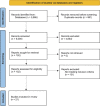Learning pain from others: a systematic review and meta-analysis of studies on placebo hypoalgesia and nocebo hyperalgesia induced by observational learning
- PMID: 37326688
- PMCID: PMC10578425
- DOI: 10.1097/j.pain.0000000000002943
Learning pain from others: a systematic review and meta-analysis of studies on placebo hypoalgesia and nocebo hyperalgesia induced by observational learning
Abstract
Observing someone experience pain relief or exacerbation after an intervention may induce placebo hypoalgesia or nocebo hyperalgesia. Understanding the factors that contribute to these effects could help in the development of strategies for optimizing treatment of chronic pain conditions. We systematically reviewed and meta-analyzed the literature on placebo hypoalgesia and nocebo hyperalgesia induced by observational learning (OL). A systematic literature search was conducted in the databases PubMed, PsycINFO, Web of Science, ScienceDirect, PsycARTICLES, Scopus, and Academic Search Ultimate. Twenty-one studies were included in the systematic review, 17 of which were suitable for meta-analysis (18 experiments; n = 764 healthy individuals). The primary end point was the standardized mean difference (SMD) for pain following placebo cues associated during OL with low vs high pain. Observational learning had a small-to-medium effect on pain ratings (SMD 0.44; 95% confidence interval [CI] 0.21-0.68; P < 0.01) and a large effect on pain expectancy (SMD 1.11; 95% CI 0.49-2.04; P < 0.01). The type of observation (in-person vs videotaped) modulated the magnitude of placebo hypoalgesia/nocebo hyperalgesia ( P < 0.01), whereas placebo type did not ( P = 0.23). Finally, OL was more effective when observers' empathic concern (but no other empathy-related factors) was higher ( r = 0.14; 95% CI 0.01-0.27; P = 0.03). Overall, the meta-analysis demonstrates that OL can shape placebo hypoalgesia and nocebo hyperalgesia. More research is needed to identify predictors of these effects and to study them in clinical populations. In the future, OL could be an important tool to help maximize placebo hypoalgesia in clinical settings.
Copyright © 2023 The Author(s). Published by Wolters Kluwer Health, Inc. on behalf of the International Association for the Study of Pain.
Conflict of interest statement
The authors have no conflicts of interest to declare.
Sponsorships or competing interests that may be relevant to content are disclosed at the end of this article.
Figures



References
-
- Adamczyk WM, Wiercioch-Kuzianik K, Bajcar EA, Bąbel P. Rewarded placebo analgesia: a new mechanism of placebo effects based on operant conditioning. Eur J Pain 2019;23:923–35. - PubMed
Publication types
MeSH terms
LinkOut - more resources
Full Text Sources

